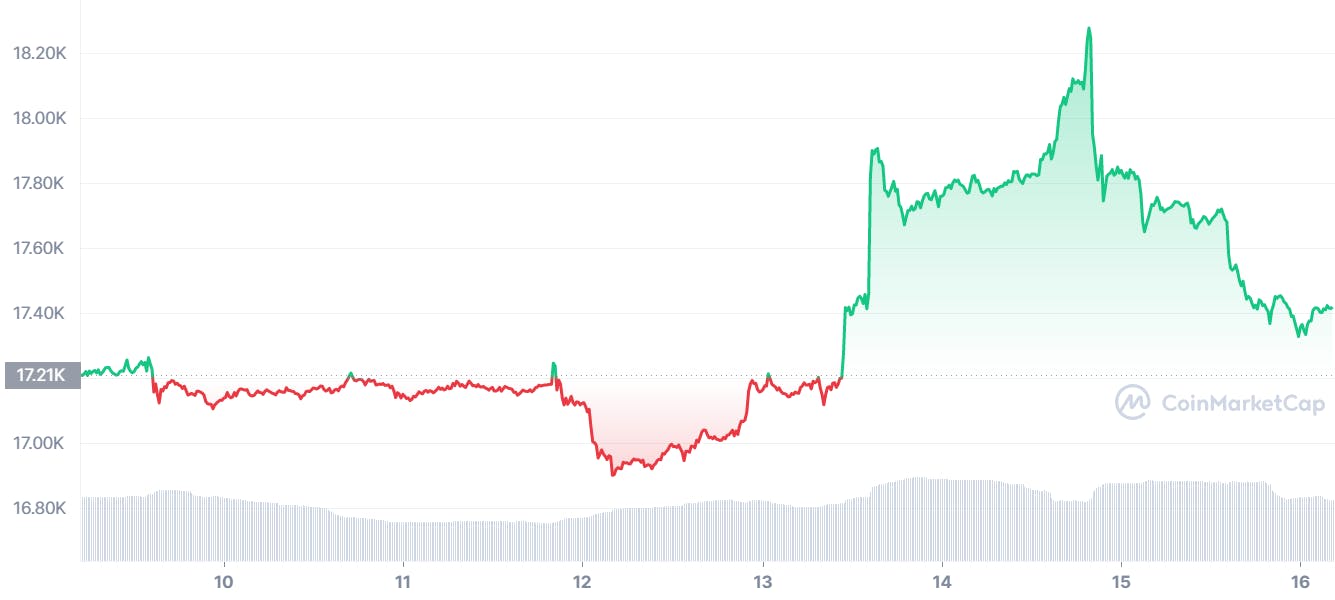Crypto Scoop: Crypto Market Cap Soars to $870 Billion As Top Cryptocurrencies Record Price Gains
Crypto Scoop
Back to blog
Yellow Card
December, 16 2022
Crypto Scoop
On this page
This week, BTC and ETH record price gains as crypto adoption continue across the globe.
Following the arrest of Sam Bankman Fried, top cryptocurrencies recorded notable price gains. In this edition of the crypto scoop, we review the following:
- Price moves of top cryptocurrencies
- Tether’s zero-secured loans promise
- Binance’s response to FUD
- Crypto initiatives and regulations across the globe
- Donald Trump’s NFT initiative and more.

Bitcoin's Price Chart (Source: Coinmarketcap)
Total Crypto Market Cap Soars past $870 Billion
This week, former CEO of FTX Sam Bankman-Fried was arrested in the Bahamas, and a US indictment was filed against him for his role in the FTX crash. These seemingly calmed the market, with top cryptocurrencies experiencing price gains. BTC almost breached $18,000, while ETH traded above $1,300.
While BTC is currently trading above $18,000 and ETH above $1,200, the price gains pushed the crypto market cap to $874 Billion.
Tether Promises Zero-Secured Loans In 2023
As post-FTX scepticism spreads throughout the cryptocurrency industry, Tether is working harder to silence its critics. The Wall Street Journal criticised Tether for its "secured loans" earlier this month. In these loans, Tether lends out its stablecoin tokens rather than selling them up front for hard currency. The company's website states that as of September 30th, these loans made up $6.1 billion, or 9%, of its reserves.
While Tether asserts that these loans are excessively collateralised by "extremely liquid" assets, it provides few details regarding the specifics of that collateral and the identities of its borrowers. By approaching it from this angle, WSJ claimed that these loans put the company's ability to fulfil stablecoin redemptions at risk.
Tether responded on Tuesday, dismissing criticism of its secured loans as more "disinformation" created by "Tether truthers" and the mainstream media (MSM). However, Tether has decided to sell them all off in 2023 to restore confidence in cryptocurrencies after FTX's crash.
Binance Hits Turbulence As Fear, Uncertainty and Doubt (FUD) Spreads.
Binance crypto exchange recorded an outflow of $2.159 billion in stablecoins in just 24 hours. Along with stablecoins, Binance has experienced a net outflow of over $2 billion in Ethereum-based token withdrawals since December 12. According to Nansen, a blockchain analytics platform, assets worth $3.6 billion were taken out of Binance in the last week.
Due to the ongoing FUD surrounding Binance, a large outflow of assets could indicate that users have lost faith in the centralised exchange. However, Changpeng Zhao, CEO of Binance, is unfazed and claims that the exchange has historically seen high withdrawal rates. The CEO considers it a good idea to periodically "stress test withdrawals" on each centralised exchange despite the unknowns.
Attempts by the company to demonstrate its proof of reserve led to the recent uncertainty surrounding Binance. Mazars claimed that Binance's Reserve was over-collateralised in a report published last month. However, Binance insisted that the report was an audit. Amid Binance's efforts to maintain its reputation, Reuters published a report citing fresh accusations against the exchange for money laundering.
The exchange recently had to halt withdrawals of USDC, adding to the company's distress. Binance, on the other hand, insists that it is only momentary and results from a stablecoin-related token swap. Yet, CEO Changpeng Zhao asserts, "FUD helps us grow, even though they are thoroughly annoying. You can FUD about someone without explicitly mentioning their name, which spreads awareness. It also helps unite their supporters because it forms a common defence alliance."
Crypto Initiatives And Regulation Across The Globe
In partnership with Polygon, Jewel Bank will launch Bermuda's first USD-backed stablecoin called Jewel USD (JUSD). The JUSD stablecoin will allow real-time settlements for institutional investors in the territory with a 1:1 peg to the United States dollar. Although an official launch date has yet to be set, the bank said it should happen within the next few months.
New York State has issued guidance for banks seeking to engage in activities with crypto. The guidance, which took effect immediately, describes the application process and "summarises the types of information the Department considers relevant" for obtaining the agency's approval.
According to the Financial Times, Hervé Maurey, a French Senate finance commission member, proposed an amendment to eliminate a clause enabling crypto companies to operate without a full license until 2026. Maurey's amendment will end the option to operate without stringent checks as it will oblige companies to obtain a license from the Autorité des Marchés Financiers (AMF) from October 2023.

Trump Cards (Source: New York Post)
Former US President Donald Trump launched an NFT collection
Donald Trump, a former US president, debuted his first NFT collection, dubbed Collect Trump Cards. The maximum number of NFTs that may be minted during the sweepstakes entry period is 45,000. Each NFT is priced at $99 on the official website.
The Official Donald Trump NFT Collection Sweepstakes is only open to those 18 or older and legal residents of all 50 United States and the District of Columbia. Interestingly, the collection debuted three years after Trump declared he wasn't a fan of Bitcoin and other cryptocurrencies.
Apple and Opera Crypto, NFT, Metaverse Initiatives
In order to comply with new anti-monopolistic regulations from the European Union (EU), tech giant Apple is preparing to allow third-party app stores on its devices. This is a massive win for crypto and NFT app developers, at least in Europe.
According to a Bloomberg report, European customers can download alternative app marketplaces outside of Apple's exclusive App Store, enabling them to download apps that avoid Apple's 30% commissions and app restrictions.
Opera Web3 browser has unveiled a new set of security tools to reduce common risks from bad actors in the Web3 ecosystem. Web3 Guard, a new set of security tools, is a collection of browser security features that claim to shield users from malicious decentralised applications (DApps), attacks using seed phrases as phishing bait, and bad actors.
This gives users a better understanding and warns them if any of the vulnerabilities mentioned above are discovered. Without jeopardising users' privacy or personal data, the built-in security tools would also check for any seed phrase phishing attacks by scanning web pages for telltale signs of exploit, such as typical phishing keywords and properties.
Disclaimer: This article is for information purposes only and should not be construed as legal, tax, investment or financial advice. Nothing contained in this article constitutes a solicitation, recommendation, endorsement or offer by Yellow Card to buy or sell any digital asset. There is risk involved in investing or transacting in digital assets, please seek professional advice if you require one. We do not assume any responsibility or liability for any loss or damage you may incur dealing with digital assets. For more information on Digital Asset Risk Disclosure please see - Risk Disclosure.



